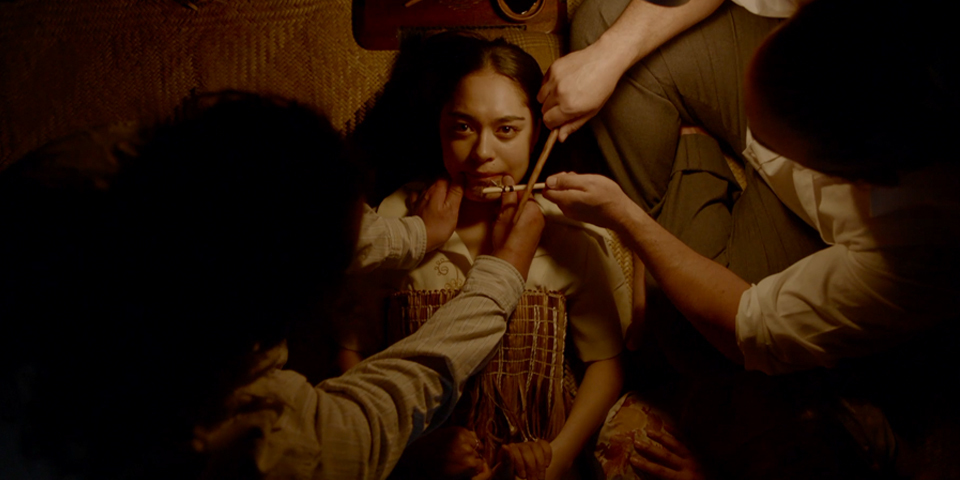This very original film revolves around the lives of three cousins – Mata, Matareka and Missy, depicting their lives at three different stages – as little girls in 1950s New Zealand, as teenagers and as women in their late sixties in the present.
They all have Maori mothers but Mata’s white father abandons her to the care of an orphanage when her mother dies, and she’s the central figure in the narrative – the one lost to her family in her childhood.
Matareka is the ‘spoiled one’, the pretty girl with the supportive parents who seems to get all the breaks, but her aspirations to do well in the wider pakeha world come up against Maori cultural expectations when she is promised in a marriage intended to solidify tribal bonds and thereby secure traditional land rights.
Missy is a tomboy, fond of American westerns as a kid, taking her love of all things cowboy into her adulthood. She seems headed for an otherwise unexceptional life but she too feels the pull of cultural expectations at a crucial point in her life. I’m being deliberately vague about the details so as not to do spoilers at this stage; far better to let the story unfold at the pace intended by the filmmakers.
Mata is the first one we meet, and she’s a sorry sight. She appears to be homeless and a bit crazy. She wanders the streets in a green coat (significance later explained), compelled for some reason to enact a kind of nutty ritual – taking off her shoes and reciting a nursery-rhyme countdown – before crossing busy streets. Her face is lined with inexpressible sadness and loneliness. She doesn’t know, but we soon learn, that the clan is looking for her.
The storytelling loops around and back through the three stages of the lives of these three women. Nine different actresses play them, and as the girls age you come to appreciate how spot-on the casting is, even if you do have to concentrate during the early bits to keep track of who’s who and who belongs where.
Belonging is a central theme of Cousins, as are Maori identity and politics. Given the settings of time and place it’s all very plausible, even if the film does lay it on a bit thick about the healing power of culture and family. I feel a bit churlish in saying this, and others may not share my skeptical aversion to sentimental excess in these matters.
Mostly the story rings true, and I have just one main gripe with the plot: it doesn’t properly explain why Mata ends up a crazy bag lady. In her young adulthood she seems to have overcome the disadvantages of her upbringing to get a good job, a nice place to live and even a handsome young Maori fella with a nice family. The suggestion is that she’s already plunging into some kind of mental abyss, and when an old friend from the orphanage re-enters her life it leads to a last straw situation that seems to tip her over the edge, because this is the last time we see Mata fully compos mentis. Decades later she’s the shuffling, muttering wreck we met at the beginning, but we don’t really know what’s happened in the meantime.
The pakeha – white European – characters who figure in the story are of decidedly secondary importance, with the exception of the wicked stepmother type who becomes Mata’s guardian when she leaves the orphanage and who constantly puts her down on account of her race and skin colour. They are a mixed bunch, and Cousins doesn’t make the mistake of demonising their whiteness or turning them into stereotypes. There’s a gaggle of mean girls who torment Mata at the orphanage, but the old friend who turns up later is a cheerful and tough ally, and the workmates at Mata’s first job are jolly and supportive. Even the wicked guardian lady is saved from caricature by one poignant scene where – one little spoiler – she brushes the girl’s hair.
The streets of the unnamed cities where Mata wanders are grimy and unforgiving, a deep contrast to the lush green meadows, hillsides and coastlines inhabited by her Maori kin living ‘on country’, as we say. The filmmakers are obviously making a political point, but it’s a thoughtful one. The New Zealand shown here is not the wild dark forests of Hunt For The Wilderpeople nor is it layered over with a fairytale sheen as in Lord of the Rings. This New Zealand, though still beautiful, has been partially tamed by its original human inhabitants, and they are telling us they like it that way.





